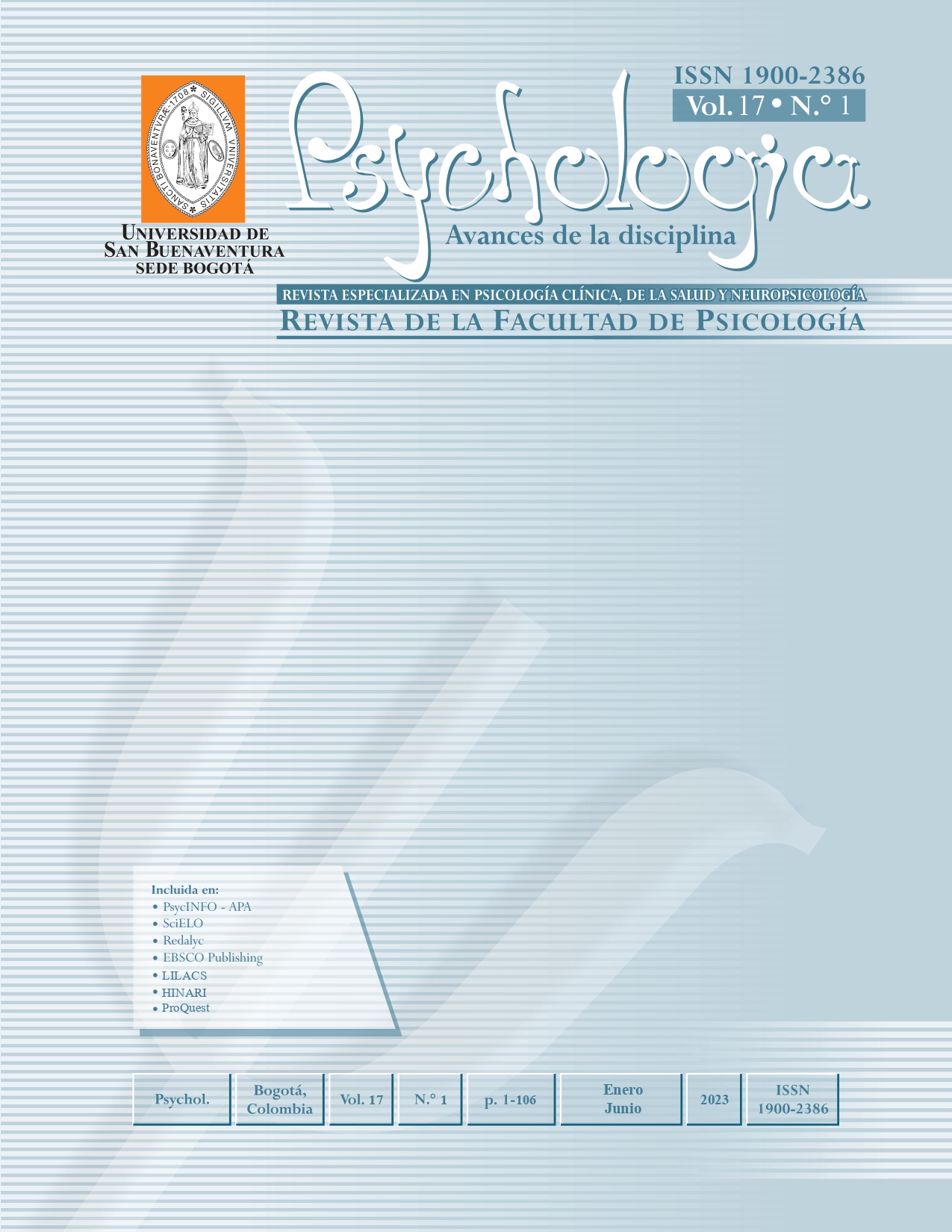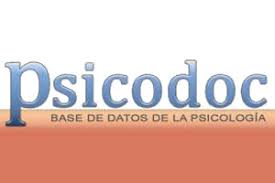This journal provides open, immediate access to its contents, based on the principle that offering the public free access to research helps to promote a higher global exchange of knowledge.
As such, all journal articles are published under a Creative Commons Attribution-NonCommercial-ShareAlike 4.0 International License (CC BY-NC-SA), by which commercial use of the original work or its possible derived works is not allowed, and the distribution thereof must be done with the same license elements regulating the original work.
http://creativecommons.org/licenses/by-nc-sa/4.0/
Abstract
El objetivo del presente estudio fue evaluar las relaciones entre el Bienestar Psicológico y la Resiliencia en 54 empleados de enfermería de un Hospital de la ciudad de Medellín. El diseño del estudio fue descriptivo correlacional de corte transversal. Instrumentos: se empleó la Escala de Resiliencia de Connor-Davidson (CD-RISC 10) y la Escala de Bienestar Psicológico de Ryff. Resultados: se encontró, por un lado, altos niveles de Resiliencia y Bienestar Psicológico en la muestra de estudio y, por otro lado, la Resiliencia tuvo correlaciones positivas con todos los dominios de la escala de Bienestar Psicológico de Ryff. En especial, los dominios de Propósito en la vida y Autonomía tienen un peso significativo sobre la resiliencia. Conclusiones: una resiliencia fortalecida mejora la percepción de bienestar psicológico en el personal de enfermería y una mejor percepción de bienestar psicológico potencia la resiliencia. El tener un propósito claro en la vida y mantener la propia individualidad en diferentes contextos a pesar de las presiones son marcadores positivos para promover la resiliencia en Enfermería y Profesiones Sanitarias.
References
Arrogante, O., Pérez-García, A., & Aparicio-Zaldívar, E. (2015). Bienestar Psicológico en enfermería: relaciones con resiliencia y afrontamiento. Enfermería Clínica, 25(2), 73-80. http://dx.doi.org/10.1016/j.enfcli.2014.12.009.
Barratt, C. (2018). Developing resilience: the role of nurses, healthcare teams and organisations. Nursing Standard, 33(7), 43-49. https://doi.org/10.7748/ns.2018.e1123.
Benavente-Cuesta, M., & Quevedo-Aguado, M. (2018). Resiliencia, Bienestar Psicológico y Estrategias de Afrontamiento: Implicaciones Sobre la Salud. En M. Badanes-Sastre & M. Ruiz-Herrera, Avances en Psicología Clínica (pp. 117-127). Asociación Española de Psicología Conductual.
Bonanno, G. (2004). Loss, Trauma, and Human Resilience: Have we underestimated the Human Capacity to Thrive After Extremely Aversive Events? American Psychologist 59(1), 20-28. https://doi.org/10.1037/0003-066X.59.1.20.
Brennan, E. (2017). Towards resilience and wellbeing in nurses. British Journal of Nursing, 26(1), 43-47. https://doi.org/10.12968/bjon.2017.26.1.43.
Campbell-Sills, L., & Stein, M. (2007). Psychometric analysis and refinement of the Connor-Davidson Resilience Scale (CD-RISC): validation of a 10-item measure of resilience. Journal of Traumatic Stress, 20(6), 1019-1028. DOI: 10.1002/jts.20271.
Cuartas, V., Cano, A., López-Carvajal, L., & Quintero, J. (2018). Trastornos del Estado de Ánimo en Trabajadores de la Salud de un Hospital de Tercer Nivel de Complejidad, Medellín, Colombia, 2011-2016. Archivos de Medicina, 14(3). DOI: 10.3823/1397.
De Arco-Canoles, O., & Suarez-Calle, Z. (2018). Rol de los profesionales de enfermería en el sistema de salud colombiano. Universidad y salud, 20(2), 171-182. DOI: http://dx.doi.org/10.22267/rus.182002.121.
Delgado, C., Roche, M., Fethney, J., & Foster, K. (2021). Mental Health Nurses’ pychological well-being, mental distress, and workplace resilience: A cross-sectional survey. International Journal of Mental Health Nursing, 30, 1234-1247. https://doi.org/10.1111/inm.12874.
Dias, H., & Rodriguez, A. (2017). The well-being at work and resilience: a study correlation in nursing technicians in hospital. Revista Psicologia, Diversidade E Saúde, 6(3), 170-180. https://doi.org/10.17267/2317-3394rpds.v6i3.1434.
Díaz, D., Rodríguez, R., Blanco, A., Moreno, B., Gallardo, I., & Dierendock, D. (2006). Adaptación española Escalas de Bienestar Psicológico. Psicothema, 18(3), 572-577. https://www.redalyc.org/pdf/727/72718337.pdf.
Ensafdaran, F., Nejabat, M., Mahmoudi, A., & Shamsaei, M. (2022) Presenting a model of nurses’ psychological well-being based on the variables of spiritual health, resilience, and emotional atmosphere of the family during the corona pandemic and its effect on emotional distress tolerance of nurses. Journal of Health System Research, 18(2), 120-126. DOI: 10.48305/jhsr.v18i2.1455.
Foster, K., Shochet, I., Wurfl, A., Roche, M., Maybery, D., Shakespeare-Finch, J., & Furness, T. (2018). On PAR: A feasibility study of the Promoting Adult Resilience programme with mental health nurses. International Journal of Mental Health Nursing, 27(5), 1470-1480. https://doi.org/10.1111/inm.12447.
Gao, T., Ding, X., Chai, J., Zhang, Z., Kong Y., & Mei, S. (2017). The influence of resilience on mental health: The role of general well-being. International Journal of Nursing Practice, 23(3). https://doi.org/10.1111/ijn.12535.
Hernández, F., Gallego, R., Alcaraz, S., & González, J. (1997). La enfermería en la historia. Un análisis desde la perspectiva profesional. Cultura de los Cuidados, 1(2), 21-35. https://rua.ua.es/dspace/bitstream/10045/5239/1/CC_02_05.pdf.
Imani, E., Mohamad, S., Vanaki, Z., & Kazemnejad, A. (2018). Hospital nurses’ lived experiences of inteliggent resilience: A phenomenological study. Journal of Clinical Nursing, 27(9-10), 2031-240. https://doi.org/10.1111/jocn.14310.
Jiménez, F., & Arguedas, I. (2004). Rasgos de sentido de vida del enfoque de resiliencia en personas mayores entre los 65 y 75 años. Revista Electrónica “Actualidades Investigativas en Educación”, 4(2). https://www.redalyc.org/articulo.oa?id=44740205.
Kim, J. (2019). Nursing students’ relationships among resilience, life satisfaction, and psychological well-being on attitude to death. Korean Journal of Medical Education, 31(3), 251-260. DOI: 10.3946/kjme.2019.135.
Lerma-Martínez, V., Rosales-Arellano, G., & Gallegos-Alvarado, M. (2009). Prevalencia de ansiedad y depresión en enfermería a cargo del paciente crónico hospitalizado. Revista CONAMED, 19(54), 5-10. https://www.medigraphic.com/pdfs/conamed/con-2009/cons091b.pdf.
McAllister, M., & Mckinnon, J. (2009). The importance of teaching and learning resilience in the health disciplines: A critical review of the literature. Nurse Education Today, 29(4), 371-379. https://doi.org/10.1016/j.nedt.2008.10.011.
Morán-Astorga, M., Finez-Silva, M., Menezes, E., Pérez-Lancho, M., Urchaga-Litago, J., & Vallejo-Pérez, G. (2019). Estrategias de afrontamiento que predicen mayor resiliencia. Revista INFAD de Psicología, 4(1), 183-190.
Nikmanesh, Z., & Khosravi, Z. (2020). The effect of training emotion regulation techniques on resilience and psychological well-being among nurses in Zahedan. Advances in Nursing and Midwifery, 29(2), 1-6. DOI: 10.29252/anm-20421.
OECD (2021). Health at a Glance 2021: OECD Indicators, OECD Publishing, París. https://doi.org/10.1787/ae3016b9-en.
Pfettscher, S. (2018). Florence Nightingale: la enfermería moderna. En M.R. Alligood. Modelos y Teorías en Enfermería (pp. 50-65). Elsevier.
Pineda, C., Castro, J., & Chaparro, R. (2017). Estudio psicométrico de las Escalas de Bienestar Psicológico de Ryff en adultos jóvenes colombianos. Pensamiento psicológico, 16(1), 45-55. DOI: 10.11144/Javerianacali.PPSI16-1.epeb.
Ríos, M., Peñalver, F., & Godoy, C. (2008). Burnout y salud percibida en profesionales de enfermería de Cuidados Intensivos. Enfermería Intensiva, 19(4), 169-78. https://doi.org/10.1016/S1130-2399(08)75832-2.
Riveros-Munévar, F., Bernal, L., Bohórquez, D., Vinaccia, S., & Quiceno, J. M. (2016). Validez de constructo y confiabilidad del Connor-Davidson Resilience Scale (CD-RISC10) en población colombiana con enfermedad crónica. Salud & Sociedad, 7(2), 130-137. https://www.redalyc.org/pdf/4397/439747576001.pdf.
Riveros-Munévar, F., Bernal, L., Bohórquez, D., Vinaccia, S., & Quiceno, J. M. (2017). Análisis psicométrico del Connor-Davidson Resilience Scale (CD-RISC 10) en población universitaria colombiana. Psicología desde el Caribe, 34(3), 161-171. https://www.redalyc.org/articulo.oa?id=21356012001.
Ryff, C. (1989). Happinnes is everything, or is it? Explorations on the meaning of psychological well-being. Journal of Personality and Social Psychology, 57(6), 1069-1081. https://doi.org/10.1037/0022-3514.57.6.1069.
Tribunales Deontológicos de Psicología (2019). Manual Deontológico y Bioético del Psicólogo (7º versión). COLPSIC. https://www.colpsic.org.co/wp-content/uploads/2021/07/Acuerdo-N%C2%B0-17-de-mayo-del-2019.pdf.
Tubbert, S. (2016). Resiliency in Emergency Nurses. Journal of Emergency Nursing, 42(1), 47-52. Doi: 10.1016/j.jen.2015.05.016.
Velandia, A. (1995). Análisis crítico de las áreas de desempeño del profesional de enfermería. Avances en Enfermería, 13(2), 125-131. Disponible en: https://revistas.unal.edu.co/index.php/avenferm/article/view/16515.
Vielma, J., & Alonso, L. (2010). El estudio del bienestar psicológico subjetivo. Una breve revisión teórica. Educere, 14(49), 265-275. https://www.redalyc.org/articulo.oa?id=35617102003.
Zhai, X., Ren, L., Liu, Y., Chao-jun, M., Su, X., & Feng, B. (2021) Resilience Training for Nurses: A Meta-analysis. Journal of Hospice & Palliative Nursing, 23(6), 544-550. DOI: 10.1097/NJH.0000000000000791.
Zhuang-Shuang, L., & Hasson, F. (2020). Resilience, stress, and psychological well-being in nursing students: A systematic review. Nurse Education Today, 90, 104440. https://doi.org/10.1016/j.nedt.2020.104440.

 Perfil Google Scholar
Perfil Google Scholar




















